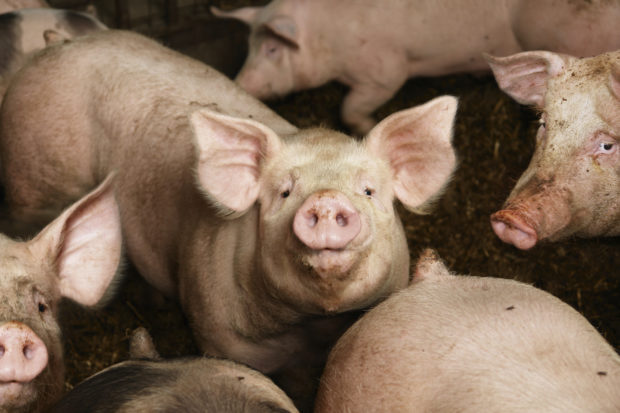
The Lee and Booker legislation will do a lot of good for family farmers, and not industry operatives who are working against family farmers’s interests and are often obsessed with fighting animal welfare or environmental standards and lobbying to secure additional subsidies from Congress. Photo by iStockphoto
Two of the youngest members of the Senate, who often come at the nation’s business from opposite ends of the political spectrum, Senators Mike Lee, R-Utah, and Cory Booker, D-New Jersey, have found common purpose in the drive to reform a series of federal government programs that have too often taken on the character of a slush fund for some agricultural commodity organizations. Their legislation, the Commodity Checkoff Program Improvement Act of 2016, introduced yesterday as S. 3201, seeks to stop big agriculture groups from using “check-off” programs – financed by “taxing” the sale of every slab of pork, carton of eggs, or other agricultural product – from using the funds generated by the program like a bank account to finance their daily operations and even their lobbying activities. Lobbying activities, importantly, that are often aimed at undermining critical protections for animals.
The senators’ proposal would strengthen prohibitions against using checkoff funds to engage in government policy advocacy, and against conflicts of interest or anti-competitive activities that harm other commodities or consumers. It would also require that checkoff programs publish all budgets and disbursements of funds for the purposes of public inspection, and submit to periodic audits by the USDA Inspector General.
Take the beef checkoff program. The industry’s biggest trade association, the National Cattleman’s Beef Association (NCBA), is the primary contractor for beef checkoff advertising efforts, despite the fact the group claims membership of only 3.1 percent of America’s cattlemen. NCBA receives the majority of national checkoff fees, making up most of NCBA’s total budget. That’s almost every beef checkoff dollar, paid by many of the smallest farmers, going to a lobbying group that typically represents interests of the biggest producers and against interests of independent cow-calf operators. A 2010 audit of NCBA expenditures of beef checkoff dollars uncovered gross misuse of funds, resulting in an agreement by NCBA to return $216,000.00.
The pork checkoff has become the most outrageous example of abuse. Years ago, the Pork Board developed the memorable “Pork: The Other White Meat” campaign. Yet, despite its development with checkoff funds, title to the trademark was claimed by the National Pork Producers Council (NPPC) – the trade association that defends keeping pigs in lifelong inhumane confinement in small cages, the overuse of antibiotics, and so many other retrograde policies – free of charge. Then, after the trademark had near exhausted its market value, the Pork Board bought back (with checkoff dollars) its own unlawful “gift” from the NPPC – for $60 million dollars! These federal funds are now being paid out every year in $3 million installments, and they make up a third of the NPPC’s annual budget. The HSUS, along with Iowa Citizens for Community Improvement and an individual pig farmer, have sued over this gross abuse of the checkoff program and the pending lawsuit threatens to eliminate NPPC’s use of the checkoff as an illegal slush fund.
In some instances, checkoff boards have engaged in outright market manipulation, attempting to keep products that might be viewed as competitive off the shelves. In 2013, the Egg Board tried to get government regulators and retailers to take action to halt sales of Hampton Creek’s egg-free “Just Mayo” brand products, clearly worried that the widespread availability of humane alternatives would reduce their market share.
The Lee and Booker legislation threatens to upend this set of sweetheart deals for the trade groups that tend to treat checkoff dollars as a pot of gold.
At the same time, Senator Lee also introduced S. 3200, which would amend the authorizing checkoff laws to make producer participation in the program voluntary. If passed, this bill would mean that producers who don’t benefit from checkoff programs would not be obligated to pay into the scheme.
Both bills will do a lot of good for family farmers, who will no longer have to hand over their hard-earned cash to industry operatives working against their interests – operatives, moreover, they know to be disconnected from the realities of family farming, and who are often obsessed with fighting animal welfare or environmental standards and lobbying to secure additional subsidies from Congress. It’s no surprise, then, that this legislation has already garnered the support of dozens of state and national farming groups. Senator Lee’s press release lists 37 separate agriculture groups as backers of the legislation. Also in support is the Organization for Competitive Markets, the national non-profit that works to restore supply and demand based competition in the commodity sector.
In my recent book, The Humane Economy, I talk about the wave of animal-friendly reforms happening throughout so many sectors, including food and agriculture, and driven by conscious consumers and forward-thinking entrepreneurs. But I note that we have a lot more work to do, and uprooting the government subsidies to agribusiness interests is at the top of the list. That effort starts right here with the Lee and Booker bills.
Let’s pass this common sense legislation, restore fair play and free markets, and stop making things even more difficult for family farmers and for animals.
The post No more gravy train for big meat? appeared first on A Humane Nation.
Related Stories
- Breaking news: Obama Administration closes loophole and forbids slaughtering downer calves
- Time for feds to take anti-puppy-mill fight to next level
- Time to fight maneuver by Alaska congressman to allow trophy hunters, on parks and refuges, to spot grizzlies from planes and shoot them
Enviroshop is maintained by dedicated NetSys Interactive Inc. owners & employees who generously contribute their time to maintenance & editing, web design, custom programming, & website hosting for Enviroshop.
